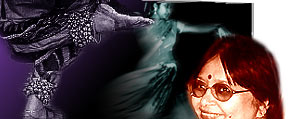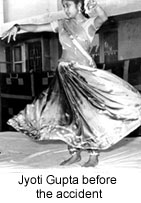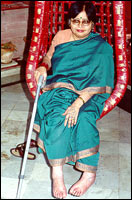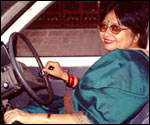The Rediff Special/ Basharat Peer


August 6, 1983. For Professor Jyoti Gupta, it was just another Saturday. The only difference was that she had offered to accompany a nervous student to Delhi University, where the latter was seeking an MA admission. Dismissing the thought of travelling by the notorious DTC buses, they decided to take a taxi.
Only, the bus had other plans. Backing unusually fast, and without any warning, it smashed into 33-year-old Jyoti. When she was finally pulled from under its wheels, there were only strangers around her. Staring. Frightened to even help her. Until one of them stepped forward.
She drove the badly-wounded Gupta to Delhi's top medical institution, the All India Institute of Medical Sciences. Denied admission there -- lack of beds was cited as the reason -- the good samaritan drove her to the Safdarjung Hospital. Where a pain-wracked Gupta was again denied admission because there was no blood relative to complete the admission formalities.
Finally, her aunt, who also a doctor, managed to get her admitted into the Sanjeevan Medical Research Centre where renowned orthopaedician Dr S P Mandal made a grim diagnosis. Jyoti was paralysed waist-down and had lost control over her urine and bowel movements. "I wet my bed a number of times at night and don't even know it," she says. "Sometimes, it even happens during the day when I am not in the house. It is like a sword hanging over my head all the time."

She spent the next three months shuttling between the hospital and her aunt's place, before finally heading home with the aid of crutches. Her children were very young then -- Vantika was barely two and Rajat was seven. They spent the next two years with relatives, as Jyoti, with the support of her husband, came to grips with her condition. The trauma took its toll on Rajat, who began to stammer. It took the specialist in his school a year to normalise Rajat's speech.
Vantika, who is now 20 and hopes to become a journalist, recalls, "Papa had to go to work and mummy could not move, so I would sit by her bed and cry. Then she would ask me to call one of our neighbours to give me some hot milk or something to eat. As I grew older, I realised my mother was different. I didn't make many friends; I was always in a hurry to get back as we needed to take care of mummy. Today, everyone in our family can cook. Rajat started helping daddy long ago. He would cook, clean, shop, do all the work in the house."
Those early responsibilities have made Rajat older than his 25 years. A BSc in Electronics, he is now completing his MCA at the Indira Gandhi National Open University and working part-time since the last four years. "I applied for a job in England, but my visa was rejected," he says. "The embassy told me that, since my mother was handicapped, I would take her to England and not return. Also, the prospect of leaving my mother holds me back."
Their childhood isn't the only loss the family suffered.

"Vinod has been celibate for 18 years now," says Jyoti. "He could have gone for some other woman, but he stood by me. He took care of me and gave me the will to live and take on the world again. At night, after the neighbours went to sleep, he would take me out in my wheelchair. He wanted me to remember that a world existed outside our four walls. He wanted me to feel the wind in my face. To see the stars and the moon. We had a love marriage. Now, the marriage part is over. All we have is love."
Which is evident as Vinod takes up the tale, "I would make breakfast for all of us and boil milk for Vantika. Then, I'd drop Rajat at school on my way to the clinic. This was our only source of income, so I could not afford to sit at home and take care of my wife and daughter. As I left in the morning, I would make sure the doors of the house were wide open so that they could call out to the neighbours. I'd return home in the afternoon, prepare lunch, then go back to work. It was very tough, but it was the only way to keep the family together."
Obviously, there could be no luxuries. "If that bus driver had been careful," says Rajat, "our lives would have been very different. Our parents would have been able to give us the attention we needed. We would have had a better education; better prospects. I remember how I went out once to buy chocolate for a relative and found it cost Rs 15. I was stunned; the last time I had bought chocolate -- it was more than 15 years ago -- it cost Rs 2."
The fear of loss has still not left the family. "My parents panic even if I am late by 15 minutes," says Rajat. "I always have to inform them when I am leaving the office and when I am expected to reach home."
At one time, the Guptas did lead normal lives. Jyoti, in particular, was a trained Kathak (a classical Indian dance) dancer. But Life, for them, changed that fateful Saturday.
 A year after her accident, a wheelchair-bound Jyoti resumed teaching at the Vivekananda Mahila College. In 1988, she bought a hand-drive Maruti car on a 60 per cent subsidy, which gave her a degree of independence. Once they had stabilised, the Guptas filed a case at the Motor Accident Claim Tribunal. It dragged on for nine years; then, they were awarded Rs 33,000.
A year after her accident, a wheelchair-bound Jyoti resumed teaching at the Vivekananda Mahila College. In 1988, she bought a hand-drive Maruti car on a 60 per cent subsidy, which gave her a degree of independence. Once they had stabilised, the Guptas filed a case at the Motor Accident Claim Tribunal. It dragged on for nine years; then, they were awarded Rs 33,000.
The family had learnt to be resilient; they refused to accept this paltry sum as their due and appealed to the Delhi High Court on November 17, 1992. And, in March, 2001, Justice K Ramamoorthy awarded Jyoti Gupta Rs 6,85,000 as compensation for her injury and the mental agony she has suffered. He directed the Delhi Transport Authority to pay her 10 per cent interest per annum from the day the accident occurred to the day the payment is made.
The DTA has been given three months time to file its appeal. One does not know how long it will take before a final judgement is made in this matter. But Jyoti Gupta refuses to give up. Justice will be done. Some day.
Design: Lynette Menezes
The Rediff Specials